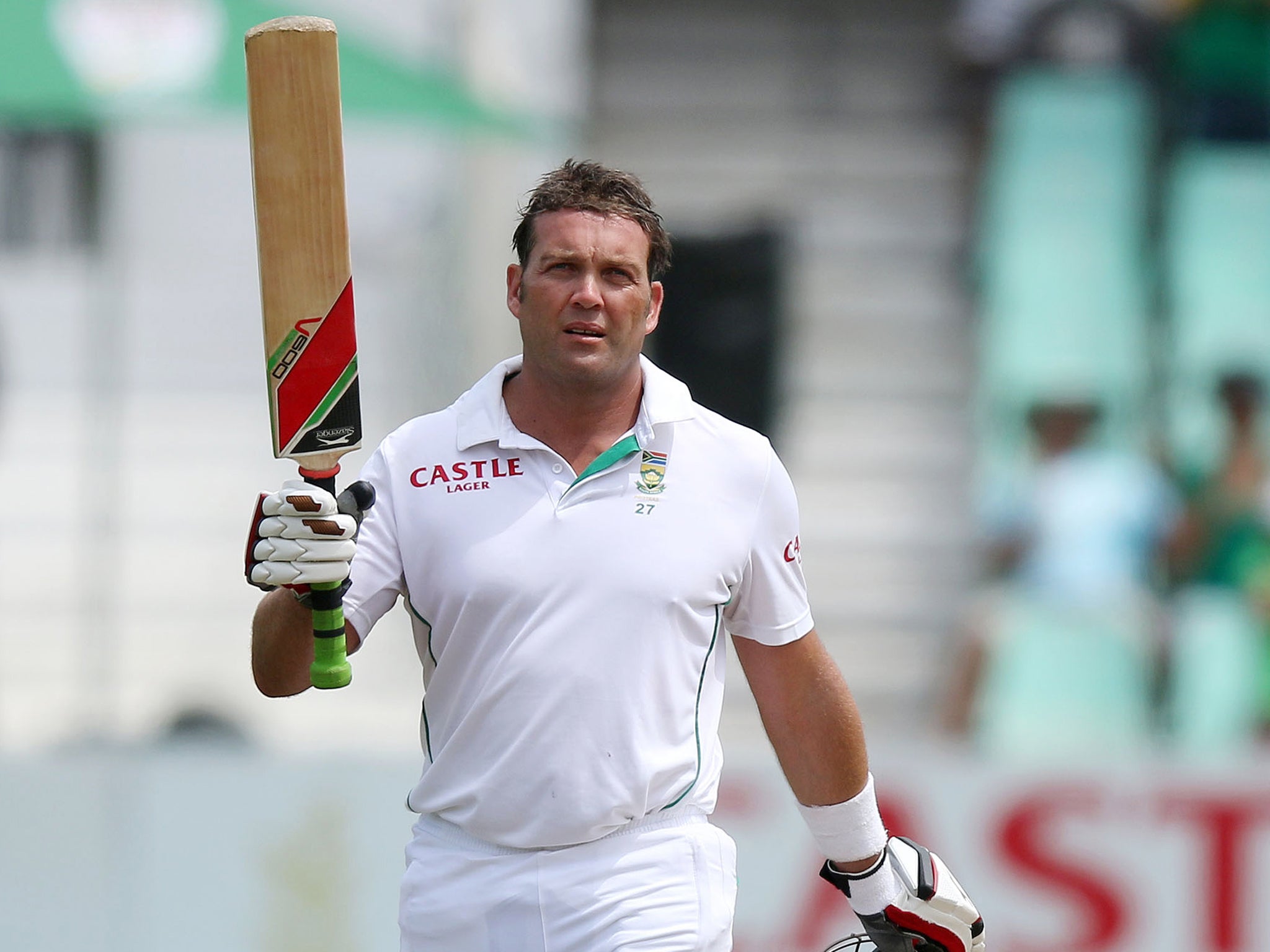Jacques Kallis retirement: South Africa’s quiet legend in class of his own
The Indian team paid tribute to Kallis as the South African walked out for his final innings before his retirement from Test cricket

Your support helps us to tell the story
From reproductive rights to climate change to Big Tech, The Independent is on the ground when the story is developing. Whether it's investigating the financials of Elon Musk's pro-Trump PAC or producing our latest documentary, 'The A Word', which shines a light on the American women fighting for reproductive rights, we know how important it is to parse out the facts from the messaging.
At such a critical moment in US history, we need reporters on the ground. Your donation allows us to keep sending journalists to speak to both sides of the story.
The Independent is trusted by Americans across the entire political spectrum. And unlike many other quality news outlets, we choose not to lock Americans out of our reporting and analysis with paywalls. We believe quality journalism should be available to everyone, paid for by those who can afford it.
Your support makes all the difference.Jacques Kallis knew when it was time to leave. Perhaps that was the most surprising aspect of his decision to end a stupendously accomplished Test career.
Of all the great players operating at the highest level, across a multitude of sports, Kallis always seemed destined to continue until so many bodily parts fell off that he needed to be carried into the middle. But a couple of months past his 38th birthday he recognised with an admirable clarity that his unique powers were waning.
No doubt he could have continued. He has been the fulcrum of South Africa’s team for almost 20 years, and the selector has not been born who could have told him his time had come.
Kallis has known no other life but big cricket. As a man of gentle and amiable disposition, he was perfectly suited to its relentless demands. Not for Kallis the self-centred worrying about travelling, upheaval and an artificial life. He simply got on with the job, the only job he had ever known. Loyal, diligent, he might have been reporting for work as a filing clerk.
Little fuss is attending Kallis’s final Test at Durban, which is also where it all started in 1995, despite the fact that, on 78 not out in South Africa’s first-innings score of 299 for 5 in reply to India’s 334, he is on course for a 45th Test hundred. Compare it to the exhibition match-cum-festival that Sachin Tendulkar’s 200th and final match became in Mumbai two months ago.
Kallis’s feats in the game are barely less distinguished, yet it has been his undeserving fate to be somehow undervalued, like those artists whose stuff sells for millions only after they are long gone. Tendulkar probably went on longer than he should have, though no one dared mention it. Graeme Swann, not quite so formidable in achievement, has been criticised on the other hand for retiring too soon.
But Swann saw the awful truth and acted on it. According to some he should have stayed until the end of this Ashes series, yet he realised he had nothing left to offer. That he walked before he was pushed is enviable in many ways.
The greatest tennis player of all, Roger Federer, arrived in Brisbane yesterday to start preparing for the Australian Open, which he has won four times. There is a growing chorus insisting he has gone on for too long, but he said: “I’m playing because I love the game.”
Which seems to be reason enough. Kallis, by contrast, has given up Test cricket because he wants to keep playing one-day cricket. His intention is to play in his sixth World Cup in Australia in 2015, when he will be in his 40th year.
Kallis did not say as much, but he may well have been persuaded by his recent Test batting form. It is not only that 22 innings have passed since he last scored a hundred, or even that six of his most recent eight innings have been in single figures. He has been out lbw in six of his past seven innings (it took 84 innings before that for him to lbw as many times), which is invariably a sign that the eyes are going or that the bat is coming down the wrong way. Kallis has decided that the fault cannot be rectified.
His place in the pantheon is assured. A year or so ago, Kevin Pietersen said of Kallis: “I truly believe he is the best cricketer ever. He is truly phenomenal.”
Before his final match in Durban, Kallis had scored 13,174 Test runs at an average of 55.12, taken 292 wickets at 32.53 and taken 199 catches. Only three players have scored more runs, none at a higher average, only 28 have taken more wickets, only one has caught more catches.
It is difficult to recall Kallis truly taking a game by its scruff. He is one of those players who will not be truly appreciated until he is no longer playing. There was nothing spectacular about his cover drive, his respectably paced away-swing, or the sheer speed of his reflexes at slip. It all looked so easy, so inevitable, so calm. There was never the remotest controversy, save that he might be too one-paced or fail to meet the immediate demands of the team. But South Africa lost only three of the 44 Tests in which he scored a hundred.
He was never captaincy material, claiming neither tactical astuteness nor natural leadership skills. But as a colleague he was pure gold. One of the great cricketers has left the crease.
Join our commenting forum
Join thought-provoking conversations, follow other Independent readers and see their replies
Comments